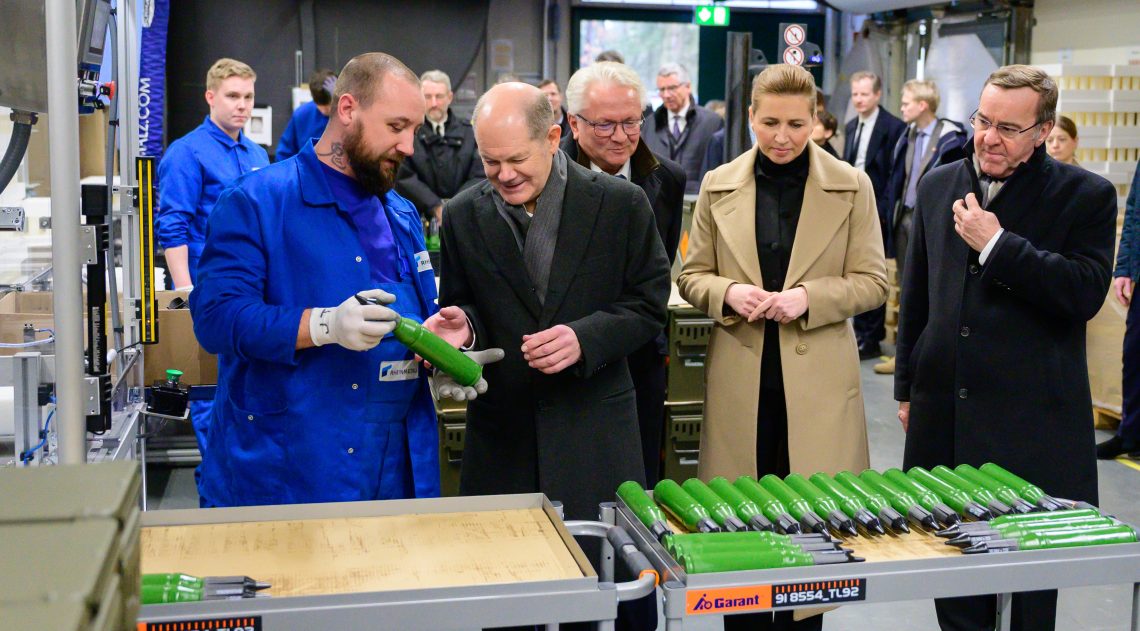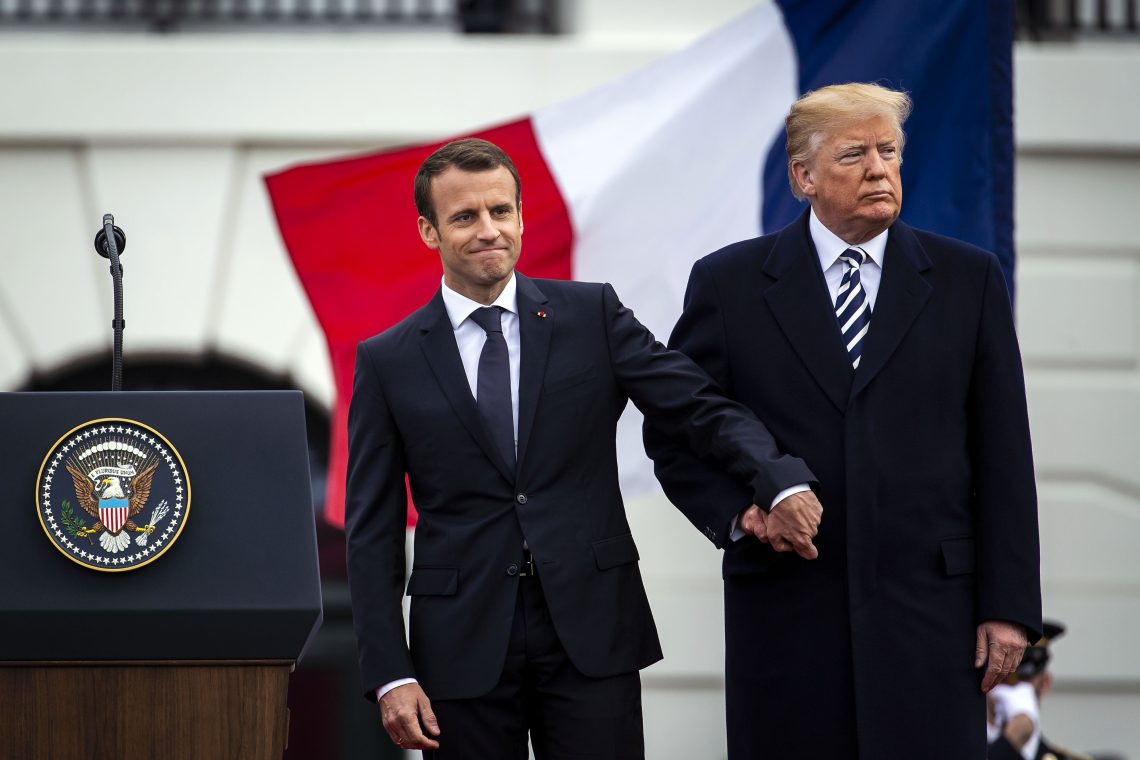A Central European perspective on EU strategic autonomy
Europe’s strategic vulnerabilities will not be rapidly overcome. But they need to be addressed, or a rift will grow between European countries.

In a nutshell
- The European Union is still deeply dependent on U.S. military support
- Complete autonomy may not be achievable in the next decades
- Tangible steps like ammunition production can still advance strategic goals
In today’s interconnected world, the notion of any continent attaining strategic autonomy can come across as a conceptual paradox. The term suggests a level of self-sufficiency and independence that seems increasingly unattainable in a globalized world.
Since World War I, Europe’s security has relied heavily on the active engagement of the United States. Any lapse in this support has consistently precipitated significant challenges in maintaining continental peace throughout the past century. Yet political elites on the continent, blinded by old European pride, still find it challenging to accept their dependence on external forces.
The myth of European strategic autonomy
Today, the discourse around strategic autonomy largely centers on the European Union’s aspiration to operate autonomously, both in the military and economic spheres. The concept has been circulating for over a decade, first appearing in the conclusions of the European Council in December 2013. It has since been mentioned in various EU documents, including the EU Global Strategy of 2016, and reiterated in statements by European politicians, national strategies and other documents. However, the general consensus was that the EU had little chance of achieving complete independence from global actors given the economic and military context at the time, and this perception remains largely unchanged today.
Some EU documents have shifted from advocating for full strategic autonomy to promoting the expansion of existing autonomy. This subtle change in language implies a pre-existing state of autonomy that merely needs enhancement. In practical terms, especially regarding defense, EU nations remain heavily reliant on the U.S. and its contributions to NATO. Still, the concept of expansion may be more realistic, since it entails a gradual process and acknowledges that such changes cannot occur rapidly.
The EU has developed various tools aimed at improving autonomy, for example the European Sky Shield Initiative, a project designed to establish a European missile shield. Based in Berlin, the project essentially leverages the air defense frameworks of some European NATO members, including the United Kingdom, as well as Switzerland. However, critics argue that the initiative lacks technological sophistication, and its political credibility is further eroded by the absence of key EU members like France and Italy.
Most attempts at fostering EU autonomy are either in the planning stage or only partially executed. Despite the proliferation of such initiatives, they remain disjointed, and collectively, they fall short of propelling the EU toward genuine autonomy.
The flawed thinking of Europe’s political elites
European politicians have often failed to accurately differentiate between an ally and a competitor, or even an adversary. European elites aspire to diminish reliance on both the U.S. and adversarial nations like Russia or China. Yet, conflating these relationships oversimplifies distinct challenges.
For nearly eight decades, the U.S. has been a pillar of the European security framework. It acts as a primary bulwark against threats from Russia and China, countries that represent potential disruptions to the European order.
The inclination toward EU strategic autonomy gained momentum around the first and second terms of U.S. President Barack Obama. Recognizing the shortcomings of the “reset” with Russia, the Obama administration shifted its focus toward Asia, notably increasing its naval presence in the Pacific Ocean and scaling back U.S. forces in Europe. This pivot coincided with the burgeoning concept of EU strategic autonomy, particularly in Brussels and Paris.
At the time, most underestimated the Kremlin’s aggressive posture. Events like Russia’s annexation of Crimea and military interventions in Donbas did not significantly alter Washington’s perception that China, rather than Russia, was the principal challenge to the West.
The idea of China as a potential usurper of U.S. global dominance became more prevalent in Washington D.C., especially as policy toward China emerged as a central theme of American strategic compromise amid the intense political rivalry of the 2016 elections. This backdrop fostered a growing apprehension among European leaders over strategic abandonment by America, intensifying the discourse on the necessity for EU strategic autonomy.
Strategic autonomy as a political tool
The concept of the EU’s strategic autonomy, initially grounded in legitimate concern over diminishing U.S. interest in its traditional European allies, then evolved into a contentious political tool. The notion particularly appealed to European politicians keen on questioning the strength of transatlantic ties, for example French President Emmanuel Macron.
In the early stages of Donald Trump’s presidency in the U.S., the pursuit of Europe’s strategic autonomy served as a politically expedient slogan for both the American leader and President Macron. Mr. Trump’s initial skepticism toward NATO eventually became a broader reluctance to support European allies.
This shift from President Obama’s efforts to encourage increased European defense spending to President Trump’s more confrontational and isolationist posture, played into President Macron’s ambitious agenda. His provocative assertion that NATO was “brain dead” paralleled Mr. Trump’s rhetoric. This was the case at the start of President Macron’s first term – in recent weeks, his approach has undergone a major change.

The resurgence of American isolationism, a stance largely absent from mainstream U.S. politics since the early 20th century, intersected with French President Macron’s ambition to forge an independent European power. This concept of European sovereignty featured prominently during France’s EU presidency in the first half of 2022.
Acknowledging the EU’s military vulnerabilities, which were not quickly amendable, President Macron’s strategy then pivoted toward economic empowerment as the primary means of enhancing EU global influence. His vision revolved around EU-wide taxes and economic relationships with China, even in defiance of Washington, for example through the Comprehensive Agreement on Investment with Beijing. The French agenda also emphasized the EU’s digital autonomy, advocating for advancements in semiconductor production, the establishment of a European “cloud,” and the imposition of additional digital market regulations. At the core of France’s strategy was the idea of consolidating the European industrial sector so that European corporations could compete more effectively against their American and Asian counterparts.
The underlying motives of both President Trump and President Macron, while outwardly focused on national and European strategic autonomy, were domestic. President Macron’s stance then was mostly a means to engage with his electorate.
Amid these discussions on strategic autonomy and NATO reforms, there lingered a belief that the transatlantic defense principle of “all for one” inadvertently exacerbated tensions with Russia. President Macron’s proposals were not met with enthusiasm even among countries traditionally critical of U.S. dominance, like Germany, Spain, Italy and smaller EU nations like Greece. And, eventually, it became clear that France’s advocacy for Europe’s strategic autonomy was essentially a rejuvenated iteration of the age-old French ambition to elevate France’s status in the EU and enhance its bargaining power with the U.S.
While this pursuit of autonomy has often clashed with the goals endorsed by successive EU presidencies, Belgium – the current president – is championing the cause at the moment.
Europe is still heavily dependent on external actors
The Covid-19 pandemic jumpstarted the EU’s quest for strategic autonomy, and the full-scale invasion of Ukraine accelerated it even further. Russia’s intensified aggression highlighted the stark realities of the EU’s reliance on external support, particularly from the U.S., for military assistance to Ukraine.
The EU has made strides toward energy independence from Russia, although this endeavor remains incomplete. Efforts to reduce economic reliance on China have been less successful. The gap between “strategic autonomy” as a political ideal and its practical application, especially in defense, is profoundly evident.
During the Ukraine conflict, the formation of an ammunition coalition, spearheaded by European Commissioner for Internal Market Thierry Breton, was a good example of a constructive step toward strategic autonomy in response to the challenges posed by the war. The coalition’s goal to procure 1 million rounds of ammunition for 1 billion euros aimed to align the EU’s economy with Europe’s new security realities.
More by Pawel Kowal
However, despite an ambitious start, the project’s success remains uncertain. Without U.S. assistance, the EU may only achieve half of the ammunition production rates of Russia, a critical factor for both frontline defense in Donbas and precautionary stockpiling against potential Russian offensives.
Sometimes, historical outcomes hinge on seemingly minor factors. The war in Ukraine has shown that the true measure of Europe’s capability lies not in the broad rhetoric of strategic autonomy but in more tangible and immediate steps, like ammunition production.
The Weimar Triangle
Perhaps the EU will become more autonomous not through theoretical considerations but through the need for practical action. There is no doubt that, in the coming weeks, Ukraine will run out of the ammunition it received from the U.S. (I confirmed this during my personal visits to Ukraine, both in Kyiv and near the frontlines.) The consequences of a new Russian offensive would be dire for Ukraine but also for other states in the anti-Putin coalition.
In the U.S., Speaker of the House of Representatives Mike Johnson blocked congressional decisions approving military assistance to Ukraine, which forced EU countries to act. Czech President Petr Pavel secured financing to deliver 800,000 rounds of ammunition for an emergency delivery. Polish Prime Minister Donald Tusk and President Macron met Chancellor Scholz to discuss increasing German military engagement (especially allowing the delivery of Taurus missiles). Mr. Macron’s approach to the war in Ukraine has undergone a real shift in recent weeks. The French leader has now become one of the fiercest advocates of increasing aid to Ukraine, and has repeatedly brought up the possibility of dispatching NATO troops there.
The concept of strategic autonomy, once a theoretical discussion in the EU, is now being driven toward practical action by the Weimar Triangle, the European Commission, the UK and other European states (the Czech Republic, Estonia, Latvia and Lithuania). This will be especially relevant if the U.S. is less involved – for example in the case of another Trump presidency.
Scenarios
When it comes to Europe’s strategic autonomy, three things are clear. First, European security cannot be decoupled from U.S. involvement. The transatlantic alliance remains indispensable. Second, irrespective of the prevailing political party in the U.S., there is a discernible trend of diminishing American commitment to European security. Third, the ramifications of the Covid-19 pandemic, coupled with Russia’s war against Ukraine, have laid bare Europe’s strategic vulnerabilities. It is only in recent weeks that EU countries have begun to build their independence from the U.S. and actively prepare to defend themselves against Russia.
The emergence of an increasingly assertive China alongside President Vladimir Putin’s Russia presents Europe with new geopolitical challenges. These threats are confronting European states with their limitations. Changing this will require European NATO members to build conventional weapons production capacity and streamlining supplies to Ukraine.The nuclear arsenals of France and the United Kingdom, while significant, offer only limited assurances to European allies like Poland and Lithuania. Vital as these nuclear capabilities are, they fall short of providing comprehensive security guarantees, particularly for nations within Europe’s security sphere but outside formal alliance structures, like Ukraine.
The ongoing conflict in Ukraine has served as a reality check, demonstrating that the notion of EU strategic autonomy is, at present, unattainable. Even with substantial efforts from leading EU and NATO members, achieving genuine strategic independence for the EU is a distant prospect. Instead, the collective endeavor may only yield a semblance of autonomy in the foreseeable future.
Europe gradually improves its defense framework
The geopolitical pressures exerted by the Russian threat, Chinese influence and fluctuations in American policy have already started to catalyze change within the EU. Under this scenario, the quest for strategic autonomy might not be swiftly realized, but it could usher in a period of gradual strengthening for the Union – assuming EU member states can avoid significant rifts. Central European nations, in particular, stand to gain, potentially emerging as Europe’s manufacturing hub should a portion of production shift from Asia to countries like Poland and its regional neighbors.
This scenario hinges on the assumption that new internal tensions do not arise and that existing ones do not intensify. Nonetheless, the stance of countries like Hungary and Slovakia, among others, might challenge the EU’s aspirations toward even a semblance of strategic autonomy.
Complications could further unfold if consensus on issues demanding unanimity within the European Council proves elusive, or if certain member states foster closer ties with China at the expense of their relationships with the U.S. and Canada. In such circumstances, the most tangible outcome might be a “strategic micro-autonomy,” narrowly focused on enhancing the EU’s capability to produce ammunition at a scale sufficient to meet immediate needs. While seemingly modest, this achievement could still represent a significant success, potentially deterring further aggressive maneuvers by President Putin against European nations. At this stage the objective is simple: to prevent further Russian advances toward the West this year.
European defense capabilities remain weak
In this scenario, continued dominance by President Putin, coupled with sustained backing from nations like Iran and an unyielding stance against Europe, may exacerbate the strategic vulnerability of European countries, particularly those in Central and Eastern Europe. If Europe’s collective defense remains fragmented and ineffective, these nations might pivot toward seeking individual security assurances directly from the U.S., alongside bolstered military production support from America’s Asian allies.
This drift toward bilateral security arrangements, driven by disillusionment with the EU’s capacity for strategic autonomy, could have profound implications. In France, for example, there is a growing consensus that everything must be done to strengthen both NATO as a whole and the defense capabilities of its European members. The inability to foster a sense of collective resilience within the EU could lead to a broader disintegration of strategic cohesion, not just within the Union but also within NATO.
For industry-specific scenarios and bespoke geopolitical intelligence, contact us and we will provide you with more information about our advisory services.









